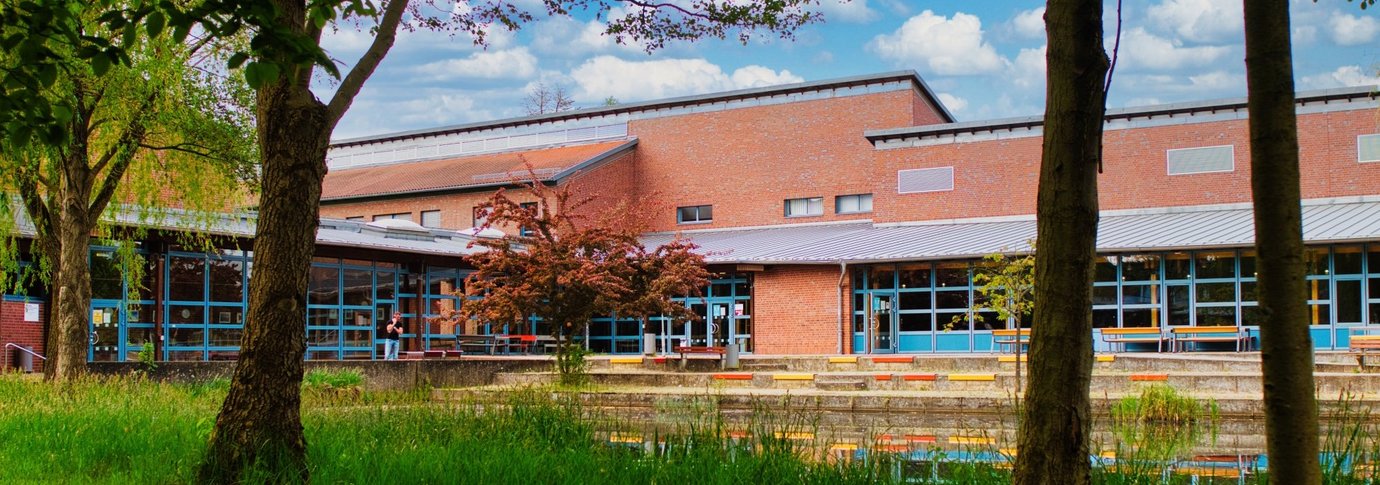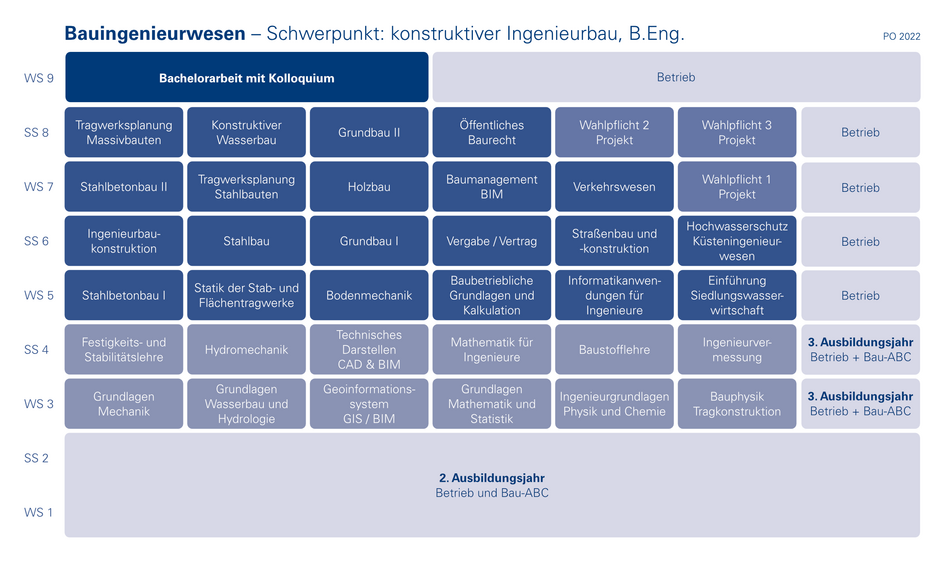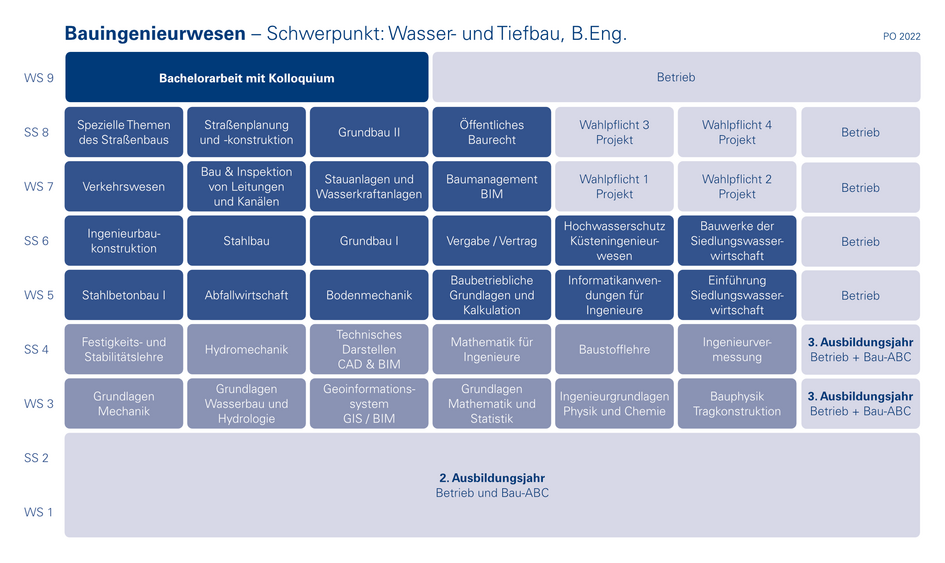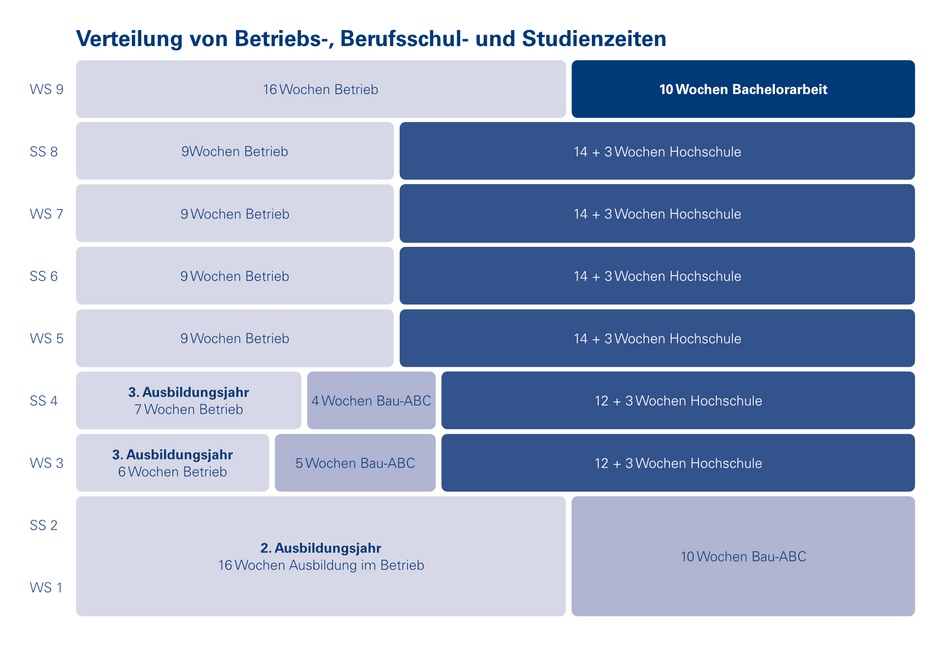Civil engineering in practice
Practical basics and sound theoretical knowledge are an unbeatable combination in any construction project.
Discover the advantages of an integrated degree programme and become an expert in the diverse tasks of civil engineering. You will combine practical training in the construction industry with a degree in civil engineering at the Suderburg campus. With this unique combination, you will be ideally equipped to embark on a wide range of career paths in construction and planning.
Facts at a glance
Think globally. Study locally.
The best combination of training and study. Take a look at our co-operation and practice partners.
To our practice partnersCivil engineering in practice - unbeatable in theory and practice
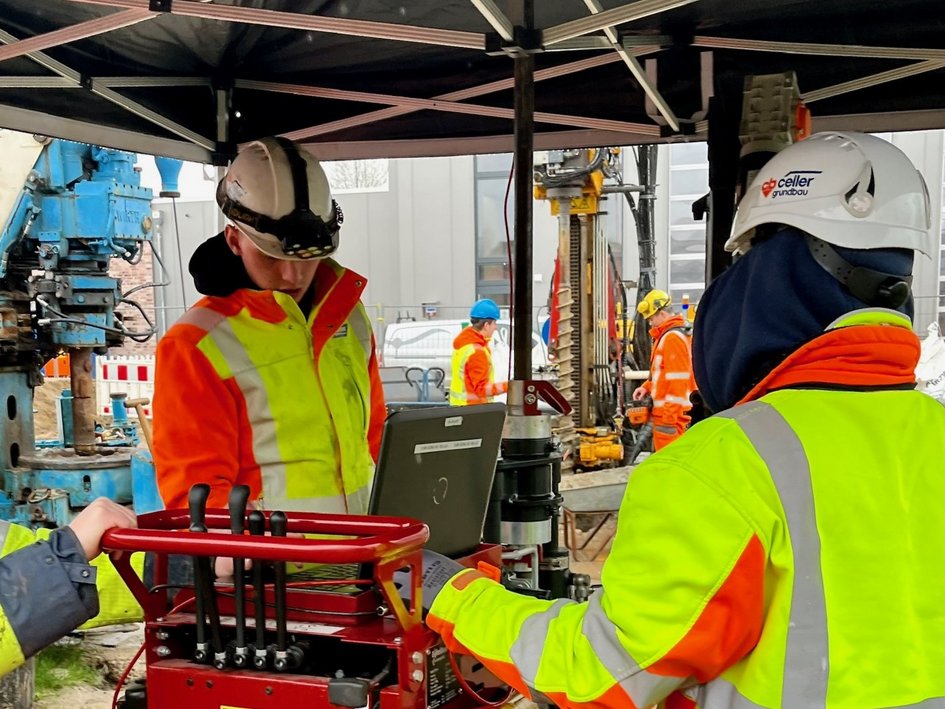
Details of the degree programme
Fields of activity
The combination of a degree in civil engineering and practical vocational training, e.g. with one of our cooperation partners, prepares you optimally for exciting tasks in the construction sector. We also attach great importance to developing your personality in order to prepare you for future management roles. Communication skills, leadership, modern management techniques and other soft skills are just as important as practical experience in dealing with people on construction sites and in planning offices.
Typical employers and areas of responsibility:
- Planning and design of structures in building construction and civil engineering, drainage, road construction, flood protection, specialised civil engineering
- Preparation of construction plans and construction drawings
- Advice on structural engineering issues
- Construction management, construction supervision, cost calculation and control, quality assurance
Programme content
Important study contents
- Construction management basics and construction management
- Strength theory, mechanics and engineering surveying
- Civil engineering construction and structural design
- Hydrology, hydromechanics and hydraulic engineering
- Flood protection and coastal engineering
- Reinforced concrete construction and timber construction
- GIS, BIM, CAD
- Soil mechanics and foundation engineering
The full course content with the respective specialisations can be found in the study plan for the Civil Engineering degree programme.
Specialisations
After the core study programme, you can choose to specialise in "Structural Engineering" or "Hydraulic and Civil Engineering".
Structural Engineering
The specialisation in "Structural Engineering" opens the door to the fascinating world of structural design and construction. Here you will become a specialist in statics and mechanics. You will learn to calculate structures such as bridges, high-rise buildings and hydraulic structures. With your knowledge of materials, load calculations and load-bearing systems, you will be an essential partner in the realisation of construction projects. Structural engineering offers you the opportunity to develop a solid foundation in the art of construction.
Water and civil engineering
The specialisation"Hydraulic and Civil Engineering" is dedicated to one of the most important resources on our planet - water. Here you will learn to develop sustainable solutions for water supply, flood defence and coastal protection. You will help to ensure that people have access to clean drinking water and are protected from flooding. You will design sewerage systems and hydraulic engineering structures that improve the efficiency of water utilisation and protect the environment at the same time. But road construction is also part of civil engineering and makes you an expert in one of the most important infrastructures in our current mobility.
Practical learning
You combine practical training in the construction industry with a degree in civil engineering at the Suderburg campus. By dovetailing training and studies, you will deepen the content of your degree programme directly in your company. It couldn't be more practical.
After the Bachelor
For graduates who have chosen to specialise in hydraulic and civil engineering , the Master's degree course in Water Management in Global Change in Suderburg is the perfect choice. However, with a Bachelor of Engineering degree from Suderburg, you are also ideally equipped to start a further Master's programme in the field of construction at another university.
Study plan
The course content from the 3rd semester(1st semester) corresponds to the course content from the first semester of the Civil Engineering degree programme.
Standard progression:
- 1. until 2nd semester: (inter)company training
- 3. to 4th semester: core study programme, (inter)company training with degree
- 5. to 8th semester: specialisation studies with focus areas
- 9. 2nd semester: practical phase, Bachelor's thesis and colloquium
Useful links and files
Guide for prospective students
Step by step
-
The career decision
First of all, you decide on one of the possible training occupations.
In co-operation with construction companies and the Bau-ABC Rostrup (inter-company training):
- Concrete and reinforced concrete worker
- Well builder
- Track layer
- Sewer builder
- Bricklayer
- Pipeline constructor
- Specialist foundation engineer
- Road builder
- Carpenter
In co-operation with the vocational school in Celle:
- Architectural draughtsman/ draughtswoman - there are different conditions for this occupation, so please register with the specialist study counselling service before starting your training (see the "Apply now!" tab).
-
Search for an apprenticeship
You are looking for an apprenticeship for your chosen occupation. You can do this by searching our partner companies.
-
-
Applying for a study place
Even if you do not start your studies at the Suderburg campus until the 3rd semester - you must register or apply for a study place at Ostfalia for the 1st semester (training semester) of the Civil Engineering in Practice programme. The most important requirements for this are
- Training contract and supplementary agreement (step 3)
- University entrance qualification or school-based part of the entrance qualification for universities of applied sciences
The degree programme begins in the winter semester, i.e. in September. The application deadline is 15 July; applications are usually possible from May.
Click here to go to the relevant pages at the Ostfalia Enrolment Office.
Partner companies
Our cooperation partners offer apprenticeships as part of the Civil Engineering degree programme. You can apply directly to these companies for an apprenticeship.
Other interested companies are welcome as co-operation partners. You can therefore also contact a potential training company in your region that is not yet one of our co-operation partners. The further procedure for the company can be found under "Guidelines for companies".
-
Aerzener Bau GmbH
Förden 21
31855 Aerzen• Straßenbauer/in
🌐 www.aerzener-bau.de
-
aqua consult Ingenieur GmbH
Mengendamm 16
30177 Hannover
• Bauzeichner/in
🌐 www.aqua-consult.de
-
August Reiners Bauunternehmung GmbH
Volkmaroder Str. 37
38104 Braunschweig
🌐 www.august-reiners.de
-
Bau-ABC Rostrup
Bildungscentrum der Bauwirtschaft Niedersachsen-Bremen
Virchowstraße 5
26160 Bad Zwischenahn
🌐 www.bau-abc-rostrup.de
-
Bauindustrie Niedersachsen-Bremen
Standort Hannover:
Eichstraße 19
30161 Hannover
Standort Bremen | Bürgermeister-Spitta-Allee 18, 28329 Bremen
Tel.: 0421 20349-0
🌐 www.bauindustrie-nord.de -
Benckendorf Bauunternehmung - Ing. Dieter Benckendorf GmbH
Heinrich-Hertz-Sraße 19
31228 Peine• Rohrleitungsbauer/inKanalbauer/inStraßenbauer/inBauzeichner/in (Fachrichtung Tiefbau)
🌐 www.benckendorf.de
-
BothmerHübner Partnerschaft mbB - Architekt & Beratender Ingenieur
Hetendorf 47
29320 Südheide🌐 www.bothmerhuebner.de
-
Cornils GmbH
Am Umspannwerk 1+2
29303 Bergen• Bauzeichner*in
🌐 www.cornils.de
-
Dasenbrock Horizontalbohrtechnik GmbH
Vechtaer Marsch 9
49377 Vechta• Brunnenbauer/in
• Spezialtiefbauer/in🌐 www.dasenbrock.de
-
Degenhard Straßen- und Tiefbau GmbH
Riethornweg 3
31303 Burgdorf
• Straßenbauer/in
🌐 www.degenhard-bau.de
-
Depenbrock Bau GmbH & Co.KG
Vechtaer Marsch 9
49377 Vechta• Straßenbauer/in
• Maurer/in
• Beton- und Stahlbetonbauer/in🌐 www.depenbrock.de
-
Echterhoff Holding GmbH
c/o Industriestraße 9
49492 Westerkappeln• Kanalbauer/-in
• Beton- und Stahlbauer/-in🌐 www.echterhoff.de
-
Eiffage Infra-Lärmschutz GmbH
Bleicherwiesen 5
31224 Peine• Bauzeichner/in
🌐 www.eiffage-infra.de/laermschutz
-
Emch+Berger Projekt GmbH
Baringstraße 8
30159 Hannover• Bauzeichner/in
🌐 www.emchundberger.de/emch-berger-hannover
-
EUROVIA Beton GmbH - Niederlassung Bauwerksinstandsetzung / ZS Hamburg (BWI)
• Beton- und Stahlbetonbauer/in
www.eurovia.de
-
Ewald Kalinowsky GmbH & Co. KG
Eppenser Weg 19
29549 Bad Bevensen• Straßenbauer/in
🌐 www.kalinowsky-bau.de
-
Fliesen Dehm GmbH
Heinenkamp 7
38444Wolfsburg• Fliesenleger/in
🌐 www.dehm.eu
-
FRIEDRICH VORWERK KG (GmbH & Co.)
Niedersachsenstraße 19-21
21255 Tostedt• Rohrleitungsbauer/in
🌐 www.friedrich-vorwerk.de
-
Gerald Peters Rohrleitungsbau GmbH
Am Hang 1 - 3
29389 Bad Bodenteich
🌐 www.gpr-rohrbau.de
-
Gross Straßenbau GmbH
• Straßenbauer/in
🌐www.gross-strassenbau.de
-
GP Papenburg Baugesellschaft mbH
Anderter Str. 99c
30559 Hannover🌐 www.papenburgbau.de
-
Heinrich Brandt - Stahlbeton- und Tiefbau GmbH Co. KG
Rolandskoppel 18/20
24784 Westerrönfeldwww.heinrich-brandt.de
-
Heinze Kabelbau GmbH
Mühlheide 12
32351 Sternwede-Oppendorf
• Rohrleitungsbauer/in
• Kanalbauer/in
• Straßenbauer/in
www.heinze-kabelbau.de
-
Hölscher Wasserbau GmbH
Hinterm Busch 23
49733 Haren
• Brunnenbauer/in
www.hoelscher-wasserbau.de
-
Hoorter Brunnenbau GmbH
Hauptstr. 5
19230 Hoort
• Brunnenbauer/in
www.hoorterbrunnenbau.de
-
Horsthemke Bohrtechnik - Manfred Horsthemke GmbH & Co. Bohrtechnik KG
Marienstraße 34
33415 Verl
• Spezialtiefbauer/in
www.horsthemke-bohrtechnik.de
-
Hoth Tiefbau GmbH & Co. KG
Zunftstr. 22
21244 Buchholz i.d.N.
• Rohrleitungsbauer/in
www.hoth-tiefbau.de
-
I-Bau Behringen GmbH
Heidkamp 1
29646 Bispingen
• Kanalbauer/in
• Rohrleitungsbauer/in• Straßenbauer/in
www.i-bau.de
-
Ingenieurbüro Rauchenberger GmbH
Heinz-Kollan-Straße 1
29451 Dannenberg
• Bauzeichner/in
www.ibrauchenberger.de
-
Ingenieurgruppe Dr. Born - Dr. Ermel GmbH
Finienweg 7
28832 Achim
www.born-ermel.de
-
iTH Thomas Hinz
Bahnhofstr. 46
29556 Suderburg
• Bauzeichner/in
www.ith-info.de
-
JKS Jan Kwade & Sohn GmbH
Emlichheimer Str. 41
49824 Ringe
• Spezialtiefbauer/in
• Brunnenbauer/inwww.kwade-sohn.de
-
JOHANN BUNTE Bauunternehmung GmbH & Co. KG
Postfach 1265
26852 Papenburg
www.johann-bunte.de
-
Johann Wiese & Sohn OHG
Hasselrott 41
24214 Gettorf
• Brunnenbauer/in
• Rohrleitungsbauer/inwww.wiese-brunnenbau.de
-
Karl Möhle GmbH
Blumenstraße 9a
26188 Edewecht
• Spezialtiefbauer/in
www.moehle-tiefbau.de
-
KEMNA BAU Andreae GmbH & Co. KG – Zweigniederlassung Bauwerksinstandsetzung Mitte
Lohweg 44
30559 Hannover• Beton- und Stahlbetonbauer/in*
www.kemna.de
-
KEMNA BAU Andreae GmbH & Co. KG – Zweigniederlassung Hannover
Lohweg 44
30559 Hannover
• Straßenbauer/in
www.kemna.de
-
Kuhlmann Leitungsbau GmbH
Theodor-Marwitz-Str. 5
21337 Lüneburg
• Rohrleitungsbauer/in
• Kanalbauer/inwww.kuhlmann-leitungsbau.de
-
LÜBA Leitungsbau GmbH
Bei der Pferdehütte 12
21339 Lüneburg
• Rohrleitungsbauer/in
www.lueba.de
-
MATTHÄI Bauunternehmen GmbH & CO. KG
Le-Havre-Straße 3
28309 Bremen
• Kanalbauer/in
• Spezialtiefabauer/in
• Straßenbauer/in
• Bauzeichner/in
www.matthaei.de -
Max Kroker Bauunternehmung GmbH & Co.
Steinriedendamm 14 A
38108 Braunschweig
www.max-kroker.de
-
Mehrtens Bauunternehmen - Georg Mehrtens Ingenieurbau GmbH
Industriestraße 8
27628 Hagen im Bremischen
• Straßenbauer/in
www.mehrtens-bau.de
-
Meyer Städte & Industriereinigung GmbH
• Kanalbauer/in
www.meyer-nienburg.de
-
Mittelweser-Tiefbau GmbH & Co. KG
Nordholz 1
27333 Warpe
• Rohleitungsbauer/in
• Kanalbauer/in
• Bauzeichner/inwww.mittelweser-tiefbau.de
-
Morgenstern/Struck - Beratende Ingenieure PartG mbB
Uelzener Str. 49
29451 Dannenberg
• Bauzeichner/in
www.morgenstern-struck.de
-
Müller & Netzel GmbH & Co. KG BAUUNTERNEHMEN
Dorfstraße 14
29559 Wieren
-
Neidhardt Grundbau GmbH
Rubberstraße 27
21109 Hamburg
• Spezialtiefbauer/in
www.neidhardt-grundbau.de
-
NLStBV - Niedersächsische Landesbehörde für Straßenbau und Verkehr - Geschäftsbereich Lüneburg
Am Alten Eisenwerk 2d
21339 Lüneburg
• Bauzeichner/in
www.strassenbau.niedersachsen.de
-
Otto Schröder Tiefbaugesellschaft mbH
Am Vogelsang 9-11,
29640 Schneverdingen
www.schroeder-tiefbau.de
-
Rohr- und Tiefbau Hoya GmbH
Hertzstraße 2 - 4
27318 Hoya/Weser
• Rohrleitungsbauer/in
• Bauzeichner/inwww.rth.de
-
Saevecke GmbH Bauunternehmen
Salzwedeler Str. 47
29525 Hansestadt Uelzen
🌐 www.saevecke-bau.de
-
Schweerbau GmbH & Co. KG
Industriestraße 12
31655 Stadthagen
• Kanalbauer/in
• Straßenbauer/in
• Baugeräteführer/inwww.schweerbau.de
-
SLG Schöttle Leitungsbau GmbH
Gustav-Hagemann-Str. 27
38229 Salzgitter
www.schoettle-leitungsbau.de
-
Stehmeyer Bischoff GmbH & Co KG
Arberger Hafendamm 16
28309 Bremen
www.stehmeyer-online.de
-
STRABAG AG – Direktion Hannover-Magdeburg |
Bauweg 34
30453 Hannover
• Rohrleitungsbauer/in
• Kanalbauer/in
• Straßenbauer/in
www.strabag.com
-
STRABAG AG – Direktion Nordwest
Zum Langenberg 2
49377 Vechta
• Rohrleitungsbauer/in
• Kanalbauer/in
• Spezialtiefbauer/in
• Straßenbauer/in
www.strabag.com
-
STRABAG Umwelttechnik GmbH – Bereich Nordost
Haferwende 27
28357 Bremen
• Wasserbauer/in
• Spezialtiefbauer/in
• Umwelttechnik
www.strabag-umwelttechnik.com
-
Sven Hansen - Wasser- und Brunnenbautechnik
Rosenthaler Weg 20
21398 Neetze
• Brunnenbauer/in
• Spezialtiefbauer/in
• Rohrleitungsbauer/in
www.hansen-brunnenbau.de
-
Thade Gerdes GmbH
Gewerbestr. 23a
26506 Norden
• Brunnenbauer/in
• Spezialtiefbauer/inwww.thade-gerdes.de
-
Thieling Bau GmbH & Co. KG
Augustgroden 31
26937 Stadland
• Spezialtiefbauer/in
www.thieling.eu
-
TIB-BAU GmbH
Uelzener Str. 1
29348 Eschede
• Bauzeichner/in
• Tiefbaufacharbeiter/in
• Straßenbauer/in• Betonbauer/in
-
Tief- und Rohrleitungsbau Wilhelm Wähler GmbH
Im Speckenfeld 3a
27639 Wurster Nordseeküste
www.waehler.de
- Tel: +49 40 7975570-20 (starts a telephone call, if your device allows this)
- Email: swenzel(at)seier-gruppe.de (opens your email program) Ansprechpartnerin: Sabine Wenzel
-
Viktor Kewitz GmbH
Neu Ripdorf 21b
29525 Uelzen
• Rohrleitungsbauer/in
• Kanalbauer/in
• Spezialtiefbauer/in
• Brunnenbauer/in
🌐 www.kewitz-uelzen.de
-
Wasserverband Bersenbrück
Priggenhagener Straße 65
49593 Bersenbrück
www.wasserverband-bsb.de
-
Weinkopf - Ingenieure für Bauwesen GmbH
Johannesstr. 7a
38350 Helmstedt
• Bauzeichner/in
www.weinkopf-ingenieure.de
-
Wiesensee GmbH & Co.KG – Bauunternehmen-Betonwerk
Dorfstraße 5
29378 Wittingen-Radenbeck
www.wiesensee.de
-
Willi Meyer Bauunternehmen GmbH
Am Funkturm 25
29525 Uelzen
• Straßenbauer/in
www.meyer-bau.de
-
Zweckverband Wasserversorgung und Abwasserbehandlung Rügen
Putbuser Chaussee 1
18528 Bergen auf Rügen
• Brunnenbauer/in
• Kanalbauer/in
• Rohrleitungsbauer/in
www.zwar.de
Guide for companies
Instructions
-
"Letter of Intent"
Let us know in a "Letter of Intent (sample) (DOCX, 16.60 KB) (opens in a new window)" Informing us of your interest in offering a training place as part of the combined degree programme. We will then add you to our list of co-operation partners.
-
Search for trainees or students
We advertise our degree programmes and also draw attention to our cooperation partners. Trainees registered by the cooperation partners for the Civil Engineering degree programme in Suderburg will receive a study place confirmation from Ostfalia if they fulfil the formal admission requirements and if Ostfalia has received the company's"Letter of Intent (DOCX, 16.60 KB) (opens in a new window)". This enables us to offer your company binding study places for the degree programme in Civil Engineering with a practical component. You advertise and search for the trainees or students in your region who are best suited to your company.
Please use the following link for your job advertisements:
https://www.ostfalia.de//b/bachelor/bauingenieurwesen-im-praxisverbund -
Training contract and supplementary agreement
You must conclude the following contracts with the trainees:
- Training contract, e.g. IHK contract
- Supplementary agreement (sample)
Both must be issued in triplicate (each for the company, the university and the student).
Students receive a collectively agreed training allowance during the 3-year training programme. After completion of the industrial training programme, i.e. from the 7th semester onwards, students and companies agree the remuneration individually.
SOKA-BAU reimburses the training allowance to the companies, if authorised, for 3 years of training as follows:
1. Year of training: 10 months
2. Year of training: 6 months
3. Training year: 1 monthThe costs of inter-company training, including board and lodging, will be settled with SOKA-BAU by Bau-ABC Rostrup, if authorised.
-
Submit, register or log in
You must submit or register the training contract and supplementary agreement (step 3) with the following institutions or register the trainees:
- IHK
- SOKA-BAU
- BBS Ammerland
- Bau-ABC Rostrup
Distribution of training and study periods
The actual distribution of training and study periods may vary depending on the training occupation. Prof Dr Elfriede Ott willbe happy to answer any questions you may have .
Contact for questions about the combined degree programme
Prof. Dr.-Ing. Elfriede Ott
Professorin für
• Grundbau / Bodenmechanik
• Geotechnik
• Spezialtiefbau, Faculty of Civil and Environmental Engineering
Building A, Room A 4, Suderburg


